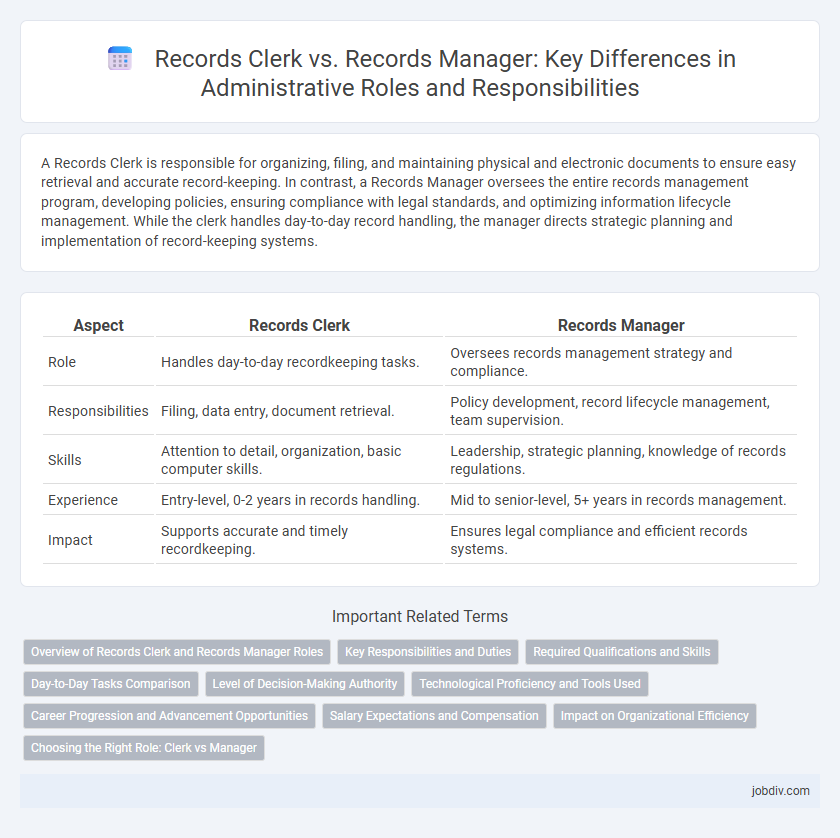A Records Clerk is responsible for organizing, filing, and maintaining physical and electronic documents to ensure easy retrieval and accurate record-keeping. In contrast, a Records Manager oversees the entire records management program, developing policies, ensuring compliance with legal standards, and optimizing information lifecycle management. While the clerk handles day-to-day record handling, the manager directs strategic planning and implementation of record-keeping systems.
Table of Comparison
| Aspect | Records Clerk | Records Manager |
|---|---|---|
| Role | Handles day-to-day recordkeeping tasks. | Oversees records management strategy and compliance. |
| Responsibilities | Filing, data entry, document retrieval. | Policy development, record lifecycle management, team supervision. |
| Skills | Attention to detail, organization, basic computer skills. | Leadership, strategic planning, knowledge of records regulations. |
| Experience | Entry-level, 0-2 years in records handling. | Mid to senior-level, 5+ years in records management. |
| Impact | Supports accurate and timely recordkeeping. | Ensures legal compliance and efficient records systems. |
Overview of Records Clerk and Records Manager Roles
Records clerks manage the organization, maintenance, and retrieval of physical and electronic documents, ensuring accurate filing and record-keeping. Records managers oversee the development and implementation of records management policies, ensuring compliance with legal regulations and optimizing information governance. Both roles are essential for effective administration but differ in scope, with clerks focusing on daily operations and managers concentrating on strategic oversight.
Key Responsibilities and Duties
Records Clerks focus on organizing, filing, and maintaining physical and digital records to ensure accuracy and accessibility, often handling data entry and retrieval tasks. Records Managers oversee the entire records management system, developing policies, ensuring regulatory compliance, and coordinating retention schedules to protect organizational information assets. Both roles are essential for effective information governance but differ in scope, with clerks performing operational duties and managers taking on strategic oversight.
Required Qualifications and Skills
Records Clerks typically require a high school diploma or equivalent with basic knowledge of filing systems, data entry, and attention to detail, while Records Managers usually need a bachelor's degree in records management, information science, or a related field, along with advanced skills in records retention policies, compliance, and digital archiving. Proficiency in document management software, organizational abilities, and understanding of regulatory requirements are essential for both roles, with Records Managers demanding stronger leadership and strategic planning capabilities. Certification such as Certified Records Manager (CRM) or Information Governance Professional (IGP) enhances the qualifications of Records Managers, underscoring their expertise in overseeing comprehensive records programs.
Day-to-Day Tasks Comparison
A Records Clerk handles the organization, filing, and maintenance of physical and digital records, ensuring documents are accurately stored and retrieved. In contrast, a Records Manager oversees the entire records management system, develops retention schedules, and ensures compliance with legal and regulatory requirements. While the clerk focuses on routine data entry and record-keeping, the manager emphasizes strategic planning and policy implementation within records administration.
Level of Decision-Making Authority
A Records Clerk typically handles routine tasks such as filing, organizing, and retrieving documents without significant decision-making authority. In contrast, a Records Manager oversees the entire records management process, making strategic decisions about record retention, compliance with legal regulations, and information governance policies. The level of decision-making authority for Records Managers includes policy development and implementation, whereas Records Clerks operate under established guidelines with limited discretion.
Technological Proficiency and Tools Used
Records Clerks primarily utilize basic data entry software, electronic filing systems, and standard office applications to manage and organize records efficiently, with a focus on accuracy and routine document processing. Records Managers employ advanced digital records management systems, enterprise content management (ECM) software, and compliance tracking tools, leveraging technology to oversee records lifecycle, implement retention policies, and ensure regulatory adherence. The technological proficiency of Records Managers extends to data analytics and automation platforms, enabling strategic oversight and optimization of record-keeping processes beyond operational tasks handled by Records Clerks.
Career Progression and Advancement Opportunities
Records Clerks typically start with data entry and document organization, gaining foundational knowledge in records management systems. Advancement opportunities include moving into Records Manager roles, where responsibilities expand to overseeing records policies, compliance, and staff supervision. Career progression often involves acquiring certifications like Certified Records Manager (CRM) and developing skills in electronic records management to enhance leadership potential.
Salary Expectations and Compensation
Records Clerks typically earn between $30,000 and $45,000 annually, reflecting entry-level responsibilities involving file organization and data entry. Records Managers command higher salaries ranging from $55,000 to $85,000, attributed to their advanced roles in overseeing records systems, compliance, and strategic document management. Compensation packages for Records Managers often include bonuses and benefits aligned with their leadership duties, whereas Records Clerks receive standard hourly wages or salaries with limited additional incentives.
Impact on Organizational Efficiency
Records Clerks maintain accurate and timely documentation by organizing and retrieving files, directly supporting daily operational workflows and reducing delays in information access. Records Managers develop and enforce comprehensive records policies, ensuring compliance, data security, and long-term information governance, which significantly minimizes risks and operational disruptions. Effective collaboration between Records Clerks and Records Managers enhances overall organizational efficiency by streamlining records management processes and optimizing information availability.
Choosing the Right Role: Clerk vs Manager
Choosing the right role between Records Clerk and Records Manager depends on your career goals and skillset. A Records Clerk handles data entry, file organization, and routine document maintenance, requiring attention to detail and basic administrative skills. Conversely, a Records Manager oversees record-keeping policies, compliance, and strategic management of information systems, demanding leadership abilities and expertise in records governance.
Records Clerk vs Records Manager Infographic

 jobdiv.com
jobdiv.com